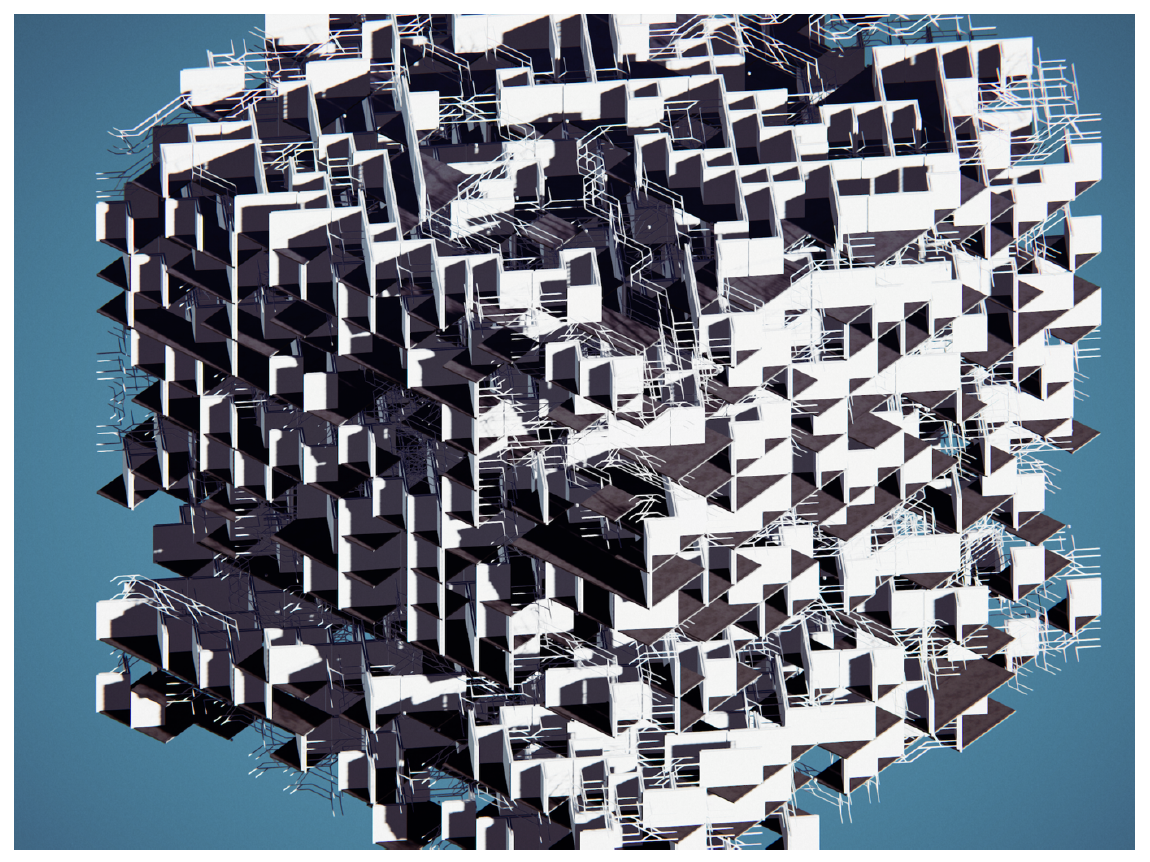From Intuition to Randomness: Combinatorics as Architectural Design Methodology in the Wave Function Collapse Algorithm
Abstract
Architectural design methods have doubtlessly changed due to the digital paradigm shift. The linear workflow of design turned to a loop and the level of human abstraction in each design phase are led by algorithmic computation. Facing this phenomenon is a puzzle for many professionals.
Instead of designing the exact output of an architectural work digital allows to plan the method of creation with possibly similar but not necessarily identical results. This paper through the examination of the Wave Function Collapse algorithm highlights the ideological tensions compared to the traditional design process by showing how the human intuition can turn to machinic randomness.
Presentation
Conference Paper
Keywords
Procedural Design, WFC, Entropy, Superposition, Archetype, Algorithm, Abstraction
Reference
DOI: https://doi.org/10.47330/DCIO.2021.ZPDW5322
Bibliography
- AHLQUIST, S. Procedural Design. University of Michigan, Taubman College of Architecture and Urban Planning.
- AMBROSIUSSEN, P. 2020. Wave Function Collapse Superchanged with PDG for Level Generation. https://www.youtube.com/watch?v=X8pNAKtWllc
- CARPO, M. 2011. Alphabet and the Algorithm. Cambridge (MA):The MIT Press.
- CARPO, M. 2017. Second Digital Turn. Cambridge (MA): The MIT Press.
- EFROS, A. A. and LEUNG, T. K. 1999. Texture synthesis by nonparametric sampling. In Computer Vision, 1999. The Proceedings of the Seventh IEEE International Conference on, Vol. 2. IEEE, IEEE Computer Society, 1999, 1033–1038.
- FOUCAULT, M. 1966. The Order of Things: : An Archaeology of the Human Sciences. France: Éditions Gallimard.
- GUMIN, M. 2016. Wave Function Collapse. https://github.com/mxgmn/WaveFunctionCollapse
- GUMIN, M. 2017. WaveFunctionCollapse Readme.md. (18 May 2017). Re- trieved May 20, 2017 from https://github.com/mxgmn/WaveFunctionCollapse/blob/master/README.md
- HEATON, R. 2018. The Wave Function Collapse Algorithm Explained Very Clearly. https://robertheaton.com/2018/12/17/wavefunction-collapse-algorithm/
- KARTH, I. and SMITH, A. M. 2017. WaveFunctionCollapse is Constraint Solving in the Wild. In Proceedings of FDG’17, Hyannis, MA, USA, August 14-17, 2017, 10 pages. https://doi.org/10.1145/3102071.3110566
- KUHN, T. 1962. The Structure of Scientific Revolutions. University of Chicago Press.
- LIANG, L., LIU, C., XU, Y.-Q., GUO, B., and SHUM, H. Y. 2001. Real-time texture synthesis by patch-based sampling. ACM Transactions on Graphics (ToG) 20, 3 (2001), 127–150.
- MEYDEN, R.V.D., PATRA, M.K., 2020. Undecidable Cases of
Model Checking Probabilistic Temporal-Epistemic Logic. ACM Trans. Comput. Logic 21, 32:1-32:26. https://doi.org/10.1145/3409250 MERRELL, P. C. 2009. Model synthesis. Ph.D. Dissertation. University of North Carolina at Chapel Hill. ROMERO, G.E., 2013. Adversus Singularitates: The Ontology of Space–Time Singularities. Found Sci 18, 297–306. https://doi.org/10.1007/s10699-012-9309-4 SALLOW, A., 2021. Implementation and Analysis of Fractals Shapes using GPU-CUDA Model. Academic Journal of Nawroz University 10, 1. https://doi.org/10.25007/ajnu.v10n2a1030 TERZIDIS, K. 2014. Permutation Design: Buildings, Texts, and Context. Routledge. WANG, G., ZOMAYA, A., MARTINEZ, G., & LI, K. (Eds.). (2015). Algorithms and Architectures for Parallel Processing: 15th International Conference, ICA3PP 2015, Zhangjiajie, China, November 18-20, 2015, Proceedings, Part I (Vol. 9528). Springer International Publishing. https://doi.org/10.1007/978-3-319-27119-4

